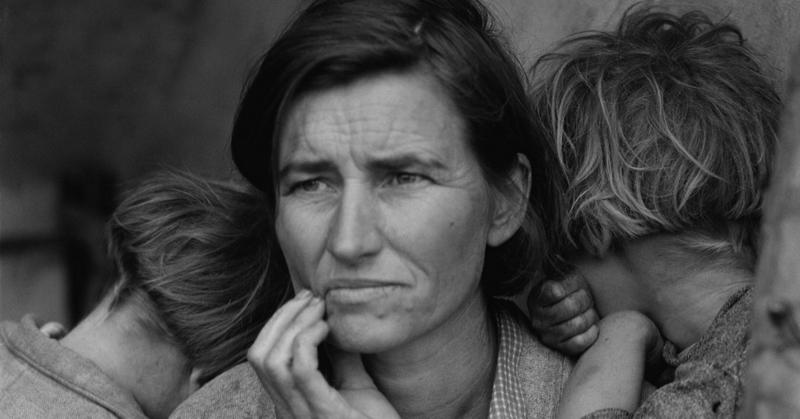Cultural PTSD: How Societal Trauma Drastically Changed Older Generations
By | April 10, 2020
Every generation has its defining moments. It can be war, famine, illness, or a combination of these things that shocks a group of people and drastically changes an entire generation. Even if most of the population escapes this cultural shift physically unscathed, they’re forever changed inside by what they've been through. Although there will always be gaps between the generations, our cultural pain makes us more similar than we realize.

The Ramifications Of Mass Grief
Whether it's the survivor's guilt of returning from war or simply the memory of being hungry for weeks at a time, the suffering of millions of people affects everyone in society. Even if they were too young or unfit to serve in Vietnam in '60s, the people of that time still understood what was happening and felt how the war was negatively affecting the people around them. Emotional pain has a way passing through osmosis in the same way that an underdog team winning the World Series makes everyone in the country feel good. Some generations have to live through a barrage of bad news: The "silent generation" lived through a World War, a pandemic, and the Great Depression, while boomers lived through a different World War and Vietnam. These kinds of things weigh on us as a group, and that changes all of us—including millennials and gen Z.

Rebuilding After A Plague
Cultural PTSD isn't a new concept. In 1400, following one of the most deadly waves of the Plague, Europe was exhausted by the sorrow of mass death. So much of their culture had fallen apart, and they'd witnessed their population halved. According to historian Barbara W. Tuchman, cultural ambitions were at an all-time low following this era of mass death. Nihilism had grasped Europe by the neck and made everyone wonder if there was a point in enduring. Obviously, culture changed and optimism returned to the world, but it took decades to rebuild. It makes sense that after such a devastating era, the immediate survivors wouldn't see a point in trying to bring civilization back to its previous state when there was a chance that everything could fall apart again.

The Great Depression Created Hoarders
During the Great Depression, the worldwide gross domestic product fell by an estimated 15%, cities that were dependent on industry were hit hard, and the men and women who lost their jobs simply had nothing to do but wait. Similarly, farming and rural communities saw their world turned upside down when crop prices fell nearly 60%. People had to hoard their precious resources to ensure their survival, and old habits die hard. After the Depression ended, the so-called "silent generation" continued to hold onto everything they could.
Decades later, as the members of this generation transition into old age, many of them are still scrimping and saving. Some of them still save sugar packets just in case there's another shortage. Even if they're financially comfortable, the memory of empty pantries has left many of them preparing for a worst-case scenario.

Shell Shock After World War II
Similar to the people who lived through the plague in the 14th century, survivors of World War II saw the world's population drastically reduced. At the onset of the war, two billion people walked the Earth, but less than a decade later, 4% of the world's population was gone. That's 80 million deaths in less than 10 years. Americans who fought in World War II had to deal with extreme PTSD that disrupted their lives in ways that they didn't even begin to understand until years after the end of the war. In the late '40s, it wasn’t socially acceptable to talk about the psychological stress of battle. As veteran Otis Mackey told the Washington Post:
When we got out, you couldn't talk about things like that. You held it all in. I didn't want to take it to my family. If you’d say anything, people wouldn't believe half of what you say anyway.

The Disillusionment Of The '60s
By the end of the Vietnam War, Americans at home and those who'd served overseas were exhausted by the lengthy battle. Returning veterans were greeted with disdain by the public, and whether they knew it or not, everyone was dealing with the psychological fallout of being embroiled in more than a decade of war, a loss of faith in the American government, and seeing a president assassinated on television.
Throughout the '60s, those born in the "baby boom" following World War II were repeatedly let down by the establishment. The Kent State shooting was a turning point for young people who thought the government existed to protect them. When soldiers fired on students in middle America, that all changed, and their trust of the government has never returned. They've since seen the economy fall apart and get stitched back together countless times, so they've never pinned their good fortunes on someone who makes decisions for them. Instead, they've come to the conclusion that the only person someone can count on is themselves.

Moving Forward
Each societal trial faced by older generations formed and molded them in ways that were imperceptible until the next generation sprang up and started to claim the world as theirs. In the cases of generations born around the onset of the 20th century, their cultural PTSD was held under the surface until recently. Not only have they learned the habits of their hoarding, distrustful parents and grandparents, they've seen their own trauma by now as well.
However, as depressing as this may sound, it's not a bad thing to have survived a worldwide calamity and come out the other side changed. Even though there are scars, something can always be learned from the situation. Hopefully, future generations will show the same determination as past cohorts in the face of whatever their lives may bring.

